Hong Kong cinema was at its peak during the 1990s era. It was also the decade where Peter Chan’s Comrades, Almost a Love Story <甜蜜蜜> took home then-record nine wins including Best Film, Best Director and Best Actress for Maggie Cheung at the 16th Hong Kong Film Awards (HKFA).
The Hong Kong Film Awards of the ’90s were equally notable for acclaimed directors like Wong Kar-Wai, who won Best Film twice for Days of Being Wild <阿飛正傳> (1990) and Chungking Express <重慶森林> (1994). Then, in 1998, Fruit Chan’s low-budget indie Made in Hong Kong <香港製造> made history as the first local movie that reflects the 1997 Hong Kong handover at the time to win the Best Film award.
Out of 50 movies that were nominated for Best Film, only 20 of them (including winners and nominees) manage to make it to our list of the 20th HKFA Best Films of the 1990s in alphabetical order.
1) Always On My Mind <搶錢夫妻> (1993)
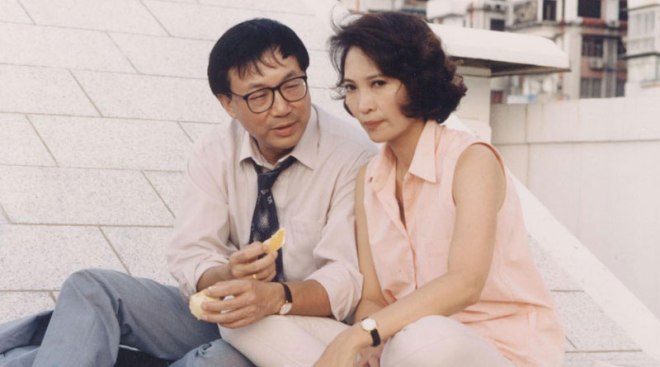
Both Always On My Mind <搶錢夫妻> and Derek Yee’s C’est La Vie, Mon Cheri <新不了情> happen to share the same theme, where one of the major characters suffered from cancer. The latter, which was only released a month earlier, turned out to be a major financial success and multiple Hong Kong Film Awards winners too.
Always On My Mind <搶錢夫妻>, in the meantime, seems like a lesser work by comparison. But this otherwise underrated comedy-drama from Jacob Cheung, who won Best Director for last year’s award-winning Cageman <籠民>, is actually a well-acted production that deserved better recognition.
Jacob Cheung’s restrained direction works well in his favour and he brings out the best in his stars, notably Michael Hui and Josephine Siao as the married couple. The former particularly proves his worth as a versatile performer in the drama territory beyond his usual comedy repertoire. The overall unhurried pace and largely uneventful moments in Always On My Mind <搶錢夫妻> might be a turn-off for some viewers. And yet, it’s hard to deny the subtle directorial touches that Jacob Cheung mostly excels with throughout the movie right down to the emotionally-penetrating finale.
2) Ashes of Time <東邪西毒> (1994)
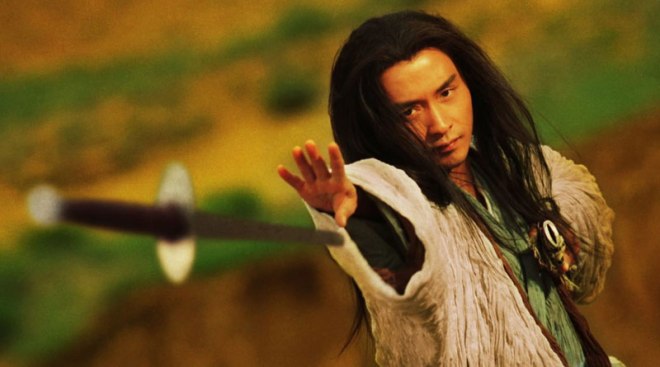
Wong Kar-Wai’s first foray into the wuxia genre famously took an astonishing two years (!) to complete production — a record for a Hong Kong production at the time. Using Louis Cha’s (Jin Yong) classic novel The Legend of the Condor Heroes as a jumping-off point, Wong — who also served as the movie’s screenwriter — re-imagines the otherwise familiar genre as a meditative swordplay drama to explore his recurring themes of isolation, memory and unrequited love. It’s clearly not for everyone and certainly not for genre purists expecting the usual stuff.
Even though Ashes of Time <東邪西毒> has Sammo Hung responsible for choreographing the sword-fight sequences, the action is heavily stylised to deliberately choppy effects, complete with lots of impressionistic blur and close-ups. Cinematographers Christopher Doyle, Andrew Lau and Chan Yuen-Kai reflect the characters’ yearnings with moody shot compositions of the movie’s predominantly barren desert landscape full of shifting shadows.
Emotions are mostly internalised and expressed via voiceovers, which has been part of Wong’s signature go-to narrative styles. The star-studded cast is generally good, notably Leslie Cheung as the main middleman-like protagonist Ouyang Feng, Tony Leung Chiu-Wai’s nameless blind swordsman character and Brigitte Lin’s dual roles as Murong Yang and Murong Yin.
3) Beast Cops <野獸刑警> (1998)

Co-directors Gordon Chan and Dante Lam tread familiar ground in their usual soap opera-style police drama seen in the likes of The Final Option <飛虎雄心> (1994) and Option Zero <G4特工> (1997). And they did it remarkably well in Beast Cops <野獸刑警>, which features great performances all around including Anthony Wong as the sleazy but loyal cop Dirty Tung and Michael Wong as the strictly by-the-book Michael Cheung.
Then, there’s Patrick Tam in his solid supporting turn as Push-Pin/Thumbtack Wa and I particularly enjoy how his character grows from a meek small-time gangster to a power-hungry triad boss. Beast Cops <野獸刑警> is admittedly heavy on dialogue and yet, Gordon Chan and Chan Hing-Kai’s layered screenplay deserves credit for the way they explore the grey line between the cops and triad underworld in a darkly humorous and even engrossing way possible. I also love how Gordon Chan and Dante Lam culminate their largely character-driven dramedy into an unexpectedly bleak and violent finale.
4) Cageman <籠民> (1992)
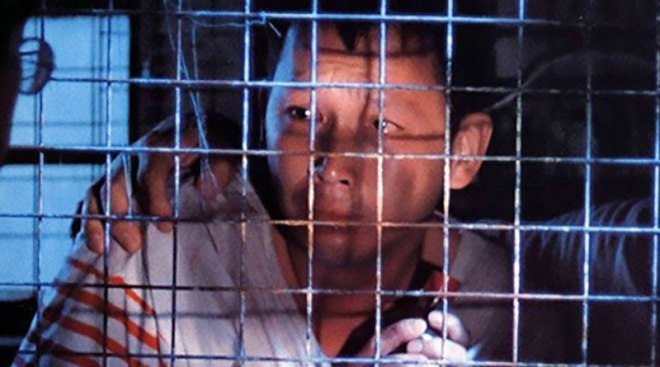
Here’s another movie directed by Jacob Cheung that made it on the list. And personally, I found Cageman <籠民> remains his best movie so far since he made his directorial debut in 1987’s Last Eunuch in China <中國最後一個太監>. The story — credited to Yank Wong Yan-Kwai, Chin Yiu-Hang, Ng Chong-Chow and Jacob Cheung himself — focuses on the residents living in the cage homes of the Wah Ha Men hostel.
Among them includes Fatso (Roy Chiao), who is in charge of taking care of the hostel and has a mentally-challenged son named Prince Sam (Liu Kai-Chi in one of his finest performances that earned him a well-deserved Best Supporting Actor award). Then, there’s Tong San (Teddy Robin Kwan), an outspoken seller of fraudulent medicines who loves to gamble and smokes a lot. 7-11 (Michael Lee) is the oldest resident who makes his living selling canned goods and never leaves his cage. Sissy (Victor Wong), who lives below 7-11’s cage, is both a loyal friend and worker while Luk Tung (Ku Feng) often helps around fixing broken things.
Cageman <籠民> brings out the best in his ensemble cast. Apart from Liu Kai-Chi, the movie features excellent performances from Roy Chiao, Teddy Robin Kwan and even Wong Ka-Kui (yes, the lead singer of the popular Hong Kong rock band, Beyond). The latter made a great lasting impression playing the young and reckless Mao. Sadly though, Cageman <籠民> was the last time we get to see him as an actor after he tragically died in a freak accident while filming a game show for Japan’s Fuji Television a year later.
Credits also go to Jacob Cheung for his low-key yet moving direction, where he doesn’t shy away from depicting the harsh reality of poor Hong Kong residents living in the cramped space of a cage home. He also manages to balance the movie’s downbeat tone with some heartwarming moments, namely a long-tracking sequence of the residents celebrating happily during the night of the Mid-Autumn Festival.
It’s a pity that Cageman <籠民> was underappreciated at the time of its release (it only made a paltry HK$1.7 million). But this must-see social drama made an impact at the 12th Hong Kong Film Awards, where it brought home four wins including Best Film, Best Director, Best Screenplay and the aforementioned Best Supporting Actor.
5) C’est La Vie, Mon Cheri <新不了情> (1993)

One of Derek Yee’s finest hours and unquestionably among the best Hong Kong tearjerkers ever made, C’est La Vie, Mon Cheri <新不了情> is actually a remake of Doe Ching’s Love Without End <不了情> (1961). And what a remake it turned out to be. Yee, who also wrote the screenplay, is careful not to succumb to the mawkish-sentimentality route typically seen in this kind of genre.
Instead, he manages to tell the story deliberately as we learn how Lau Ching-Wan’s struggling jazz-musician character of Kit first develops a love-hate friendship with Anita Yuen’s frequently optimistic Min. Like the time it takes for a friendship to blossom into love, the on-screen chemistry between Lau Ching-Wan and Anita Yuen feels genuine and above all, well-earned. And then came the inevitable third act that Yee doesn’t afraid to incorporate the fact of life can be cruel and unpredictable at any given moment.
C’est La Vie, Mon Cheri <新不了情> was a big winner both critically and financially, with the latter grossing over a whopping HK$31 million back in 1993 and even taking home six HKFA wins including Best Film, Best Director and Best Actress for Anita Yuen.
6) Chungking Express <重慶森林> (1994)
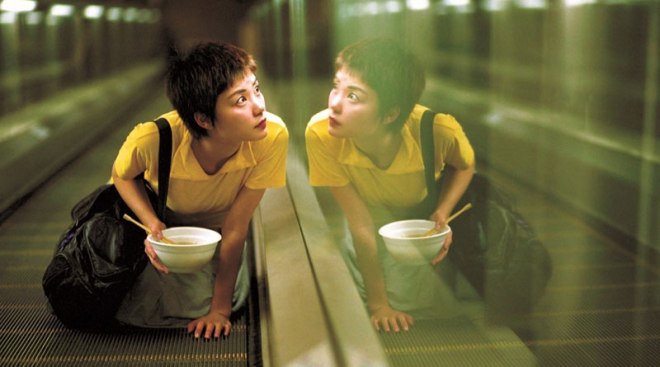
Any canned pineapple that expires on May 1?
You know what day is it today?
April 30?
Right. You think we sell outdated stock?
There’s still two hours to go.
Nobody would buy it. Get a fresh one.
Freshness? People like you are hung up on freshness. You realise what goes into a can of pineapple? The fruit must be grown, harvested, sliced… and you just throw it away! How do you think the can feels about that?
Nearly 30 years after the shot-on-the-fly Chungking Express <重慶森林> (it was completed in just 23 days!) was released to international acclaim, I still love the way writer-director Wong Kar-Wai uses an expired canned pineapple — Del Monte Sliced Pineapple in Heavy Syrup, to be exact — as a subtle allegory for heartbreak, longing and loneliness. And it helps that Takeshi Kaneshiro, whose character’s obsession over the expired canned pineapple, gives a spot-on performance as a hopelessly desolate policeman He Qiwu struggling to get over his breakup with a girl named May.
The movie is split into two stories, both of which shared the same lovelorn themes about two cops (Takeshi Kaneshiro and Tony Leung Chiu-Wai’s uniformed beat cop 663) being unlucky in love but later falling for others (Brigitte Lin’s nameless lady in blonde wig and Faye Wong’s Faye). Wong along with cinematographers Christopher Doyle and Andrew Lau establish the kind of layered mood of all things melancholy and upbeat vibes. And that includes incorporating the likes of step-printing slo-mo effects and handheld cameras while making good use of the titular cramped locations: the Chungking Mansion and the late-night snack bar of Midnight Express (the place where Faye Wong’s character worked) like never before.
Apart from Takeshi Kaneshiro, Wong brings out the best in the rest of his top-notch acting ensemble including Tony Leung Chiu-Wai, Faye Wong and Brigitte Lin. Chungking Express <重慶森林> is also notable for its brilliant use of soundtrack — The Mamas and the Papas’ “California Dreamin'” and Faye Wong’s Cantonese cover of The Cranberries’ “Dreams” — to complement the mood of the movie.
7) Comrades, Almost a Love Story <甜蜜蜜> (1996)
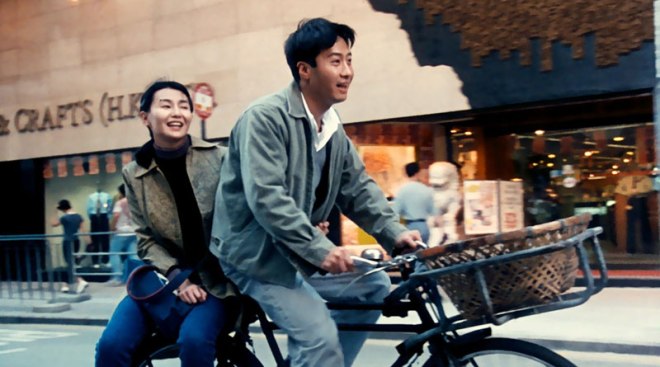
Twenty-six years may have passed since its initial release. However, Peter Chan’s multiple award-winning Comrades, Almost a Love Story <甜蜜蜜> still resonates with its bittersweet romance between two lonely Mainlanders (Leon Lai’s Lai Siu Kwan and Maggie Cheung’s Lee Kiu). Both of them share the same love for Teresa Teng’s music, notably her most famous song “Tian Mi Mi” (meaning “very sweet”, which also served as the Cantonese title of this movie).
The decade-spanning storyline — credited to Ivy Ho (1986’s Silent Love <聽不到的說話> and 1996’s The Age of Miracles <麻麻帆帆>) — along with Peter Chan’s delicate direction strikes a fine balance between the couple’s on-and-off romance and their respective lifelong dreams as immigrants trying their luck in the ever-changing cultural and economic landscape of a pre-handover Hong Kong.
The movie also benefits from Leon Lai and particularly, the ever-luminous Maggie Cheung in one of the finest performances in her acting career as the materialistic Lee Kiu. Not to forget, two of the most unforgettable moments including the famous bicycle scene and the first time they awkwardly share a love scene before fully embracing each other.
Comrades, Almost a Love Story <甜蜜蜜> was, of course, famously made HKFA history for winning the most awards at the time, where they took home a then-record-breaking nine wins including Best Film, Best Director and Best Actress for Maggie Cheung. It wasn’t until 2014 when Wong Kar-Wai’s The Grandmaster <一代宗師> broke the record, where it swept 12 wins at the 33rd Hong Kong Film Awards.
8) Crime Story <重案組> (1993)
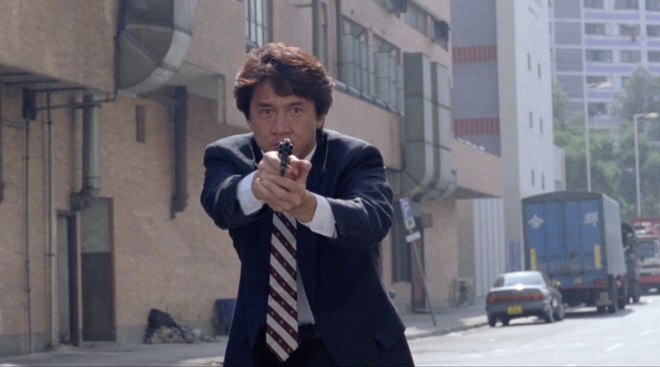
Crime Story <重案組> marks a rare departure for the usual commercially friendly Jackie Chan — a gritty cop drama featuring the Hong Kong action superstar as a no-nonsense inspector assigned to protect a real-estate tycoon, Wong Yat Fei (Law Kar-Ying) after receiving kidnapping threats.
Unlike his first Police Story <警察故事> (1985), which has a fair share of lighthearted comedy moments, you will find none of it appears in this movie. Instead, Kirk Wong — who later directs Organized Crime & Triad Bureau <重案實錄O記> and Rock N’Roll Cop <省港一號通緝犯> (both movies released in 1994) — favours a more straightforward cop vs. criminals story angle. Jackie proves he could pull off a serious cop role minus his usual comedy repertoire. But it was Kent Cheng who impresses the most as the corrupted high-ranking police officer, Hung Ting Bong. The action is thrillingly staged with enough verve, even though Jackie’s insistence to incorporate some of his usual acrobatic fight and stunt sequences feel out of place for such a cop drama.
9) Days of Being Wild <阿飛正傳> (1990)
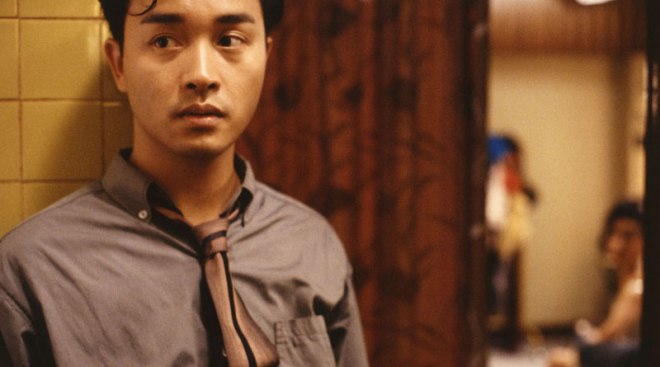
Here’s the Wong Kar-Wai movie that started it all, where he finally found his voice incorporating a distinctive filmmaking style both in storytelling and visual approaches. Unlike his commercially-accessible debut feature in As Tears Go By <旺角卡門> two years prior, Days of Being Wild <阿飛正傳> is more narratively fragmented by comparison.
All you need to know is the main storyline involved a young womaniser named York (Leslie Cheung), who’s been looking for his birth mother. He falls in love with not one but two different women on separate occasions, beginning with the shy-looking So Lai Chun (Maggie Cheung), who operates a snack bar and later, a feisty cabaret dancer named Mimi (Carina Lau).
The movie also introduces other characters including a police officer (Andy Lau) and York’s friend (Jacky Cheung), where the latter somehow has a feeling for Mimi. Days of Being Wild <阿飛正傳> showcases Wong’s poetic ways of exploring his favourite themes of yearning, loneliness, heartbreak as well as time and memory. He brings out the best in his star-studded cast, notably Leslie Cheung’s soulful turn as York, where he famously took home his first Best Actor award at the 10th Hong Kong Film Awards.
Days of Being Wild <阿飛正傳> is equally notable for Christopher Doyle’s atmospheric cinematography, complete with a dreamy shade of blue and green colour palette that dominated the movie both day and night. Wong even has a good ear for incorporating a seductive soundtrack list (Los Indios Tabajaras’ “Always in My Heart” is one of them), which complements well with the movie’s overall moody aesthetics.
Wong’s sophomore effort may hit a snag at the Hong Kong box office at the time of its release in December 1990. But Days of Being Wild <阿飛正傳> turns out to be a big hit at the Hong Kong Film Awards, winning the coveted Best Film and Best Director other than the aforementioned Best Actor statuette.
10) Fallen Angels <墮落天使> (1995)
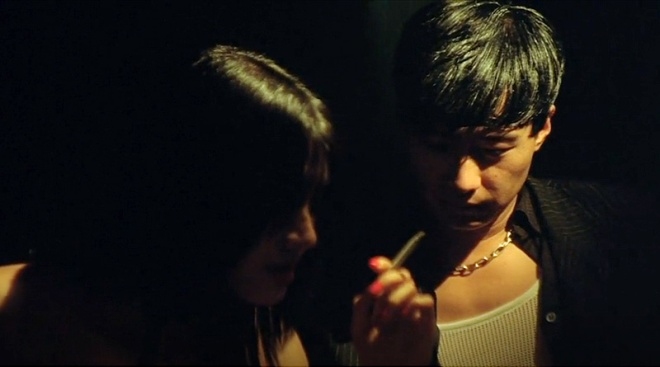
Wong Kar-Wai’s immediate follow-up to 1994’s Chungking Express <重慶森林> shared the same thematic similarities of loneliness and longing but in a more melancholy tone. This is particularly evident in one of the dual stories involving a hitman Wong Chi-Ming (Leon Lai, coolly charismatic as always) and his nameless partner-in-crime (Michelle Reis). The latter even features Michelle Reis’ cast-against-type role of a lonely and sexually frustrated woman who’s been secretly in love with Leon Lai’s Wong Chi-Ming. At one point, there’s heightened sexual energy that sees her character masturbating in his bed wearing fishnets and leather, complete with Laurie Anderson’s hypnotic piece of “Speak My Language” playing in the background.
The gun violence is highly stylised with Wong’s trademark step-printing slo-mo that instantly reminds me of his first movie in As Tears Go By <旺角卡門> (1988). Christopher Doyle’s expressive cinematography is truly a highlight here, combining wide-angle and fisheye lenses that effectively showcase the characters’ emotional detachment from the place (in this case, the neon-lit Hong Kong) they live in. Colours also played a big part in this movie, where Wong alternates from vibrant hues of red and yellow to atmospheric blue and even black and white, depending on the varied mood of the characters appearing on the screen.
As brooding as Fallen Angels <墮落天使> may have dominated throughout the movie, Wong still manages to slip in some absurdity moments, particularly when his story shifts focus on the mute He Qiwu (Takeshi Kaneshiro) and his penchant for forcing his customer to try or buy something (the ice cream scene involved an unfortunate one played by Chan Fai-Hung immediately comes to mind).
11) Full Alert <高度戒備> (1997)
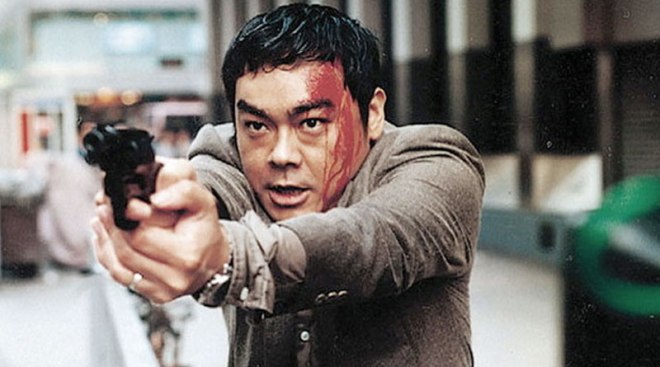
Full Alert <高度戒備> may go home empty-handed even with six nominations at the 17th Hong Kong Film Awards. But this 1997 gritty crime thriller marks a welcome return to form for Ringo Lam. I love how he incorporates his signature pessimistic overtones on both sides of the law, all grim and hopeless which contrasts with the ominous dread of the 1997 handover anxiety (the movie was released just 17 days after the Handover of Hong Kong on July 1 that same year).
Lam also brings out the best in his two main stars: Lau Ching-Wan and Francis Ng. The former’s role as a quick-tempered and no-nonsense police inspector represents among his best performances to date. The latter, in the meantime, brings enough charisma and subtlety to his antagonist character.
Then, there’s the action, where Lam took a bold risk shooting them as starkly realistic as possible. And in Full Alert <高度戒備>, he even went as far as filming them without permits. This includes the movie’s now-legendary car chase, which was shot in guerilla style that seamlessly combined stunt drivers and actual Hong Kong traffic at the time. This gives the action a heightened sense of palpable danger and Lam does them remarkably well.
12) Full Throttle <烈火戰車> (1995)
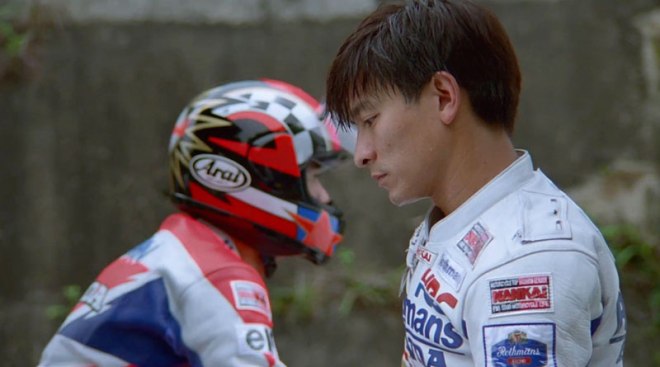
A huge hit at the time of its release in 1995, Derek Yee’s motorcycle-themed drama Full Throttle <烈火戰車> combines the tried-and-true sports genre with a well-rounded, yet affecting character-driven drama. Derek Yee also brings out the best in most of his cast, notably Andy Lau’s engaging turn as the dedicated motorcycle racer, Joe Jiang. Chin Ka-Lok nearly steals the show as Joe’s racing buddy, whose best scene involving a motorcycle race goes awry.
Speaking of the race, Full Throttle <烈火戰車> features some of the best motorcycle-racing set pieces ever seen in Hong Kong cinema. This is especially true during the final third act as Joe and his rival, David Kwan (David Wu) race against each other on a long, winding road.
13) Happy Together <春光乍洩> (1997)
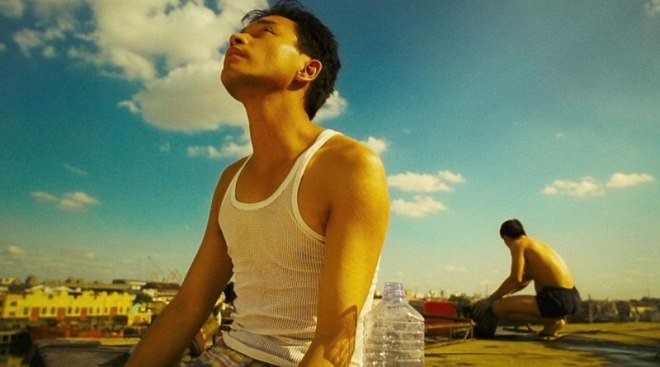
It’s hard to deny that the 1990s was the defining era for Wong Kar-Wai, where he directed a total of five acclaimed movies. And having recently revisited Happy Together <春光乍洩>, I have to say it was his best and most mature work ever made in the ’90s.
The movie covers the on-and-off relationship between Ho Po-Wing (Leslie Cheung) and Lai Yiu-Fai (Tony Leung Chiu-Wai), a gay couple who decided to travel to Argentina to see the Iguazu Falls. They got lost and even abruptly ended their relationship, with Lai Yiu-Fai subsequently ending up working as a doorman in Bueno Aires. One night he stumbles upon Ho Po-Wing, who spends time with different men.
The recurring themes of longing, time and memory are all here. Wong, who also wrote the screenplay, has a solid grasp of exploring them in a more cohesive manner. You can feel the burning passion and emotional whirlwind surrounding Ho Po-Wing and Lai Yiu-Fai’s relationship, all turbulent and uncertain. They bicker a lot, which at times feels genuinely funny to see them doing so. But other times, they would end up hurting each other emotionally. Of course, it helps that Leslie Cheung and Tony Leung Chiu-Wai give their all in one of their career-best, scene-stealing performances.
Happy Together <春光乍洩> is also worth noting for Christopher Doyle’s mesmerising cinematography, where he and Wong Kar-Wai alternate from grainy black-and-white to high-contrast colour footage that reflects the relationship of the two gay protagonists. The soundtrack selection is just as memorable, particularly Caetano Veloso’s “Cucurrucucu Paloma” playing in the background with the lingering shots of the majestic Iguazu Falls.
14) Little Cheung <細路祥> (1999)
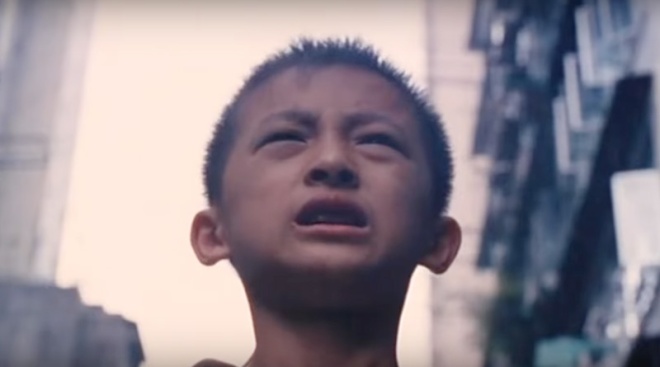
Fruit Chan’s third and final instalment of his “1997 trilogy” following Made in Hong Kong <香港製造> (1997) and The Longest Summer <去年煙花特別多> (1998) sees the writer-director focuses on the slice-of-life story of a 9-year-old boy played by non-professional newcomer Yiu Yuet-Ming. We learn that he’s a mischievous boy who helps his father’s restaurant in Mongkok deliver food to the likes of lowly gangsters and elderly residents. He also gets to know a girl named Fan (Mak Wai-Fan), who is actually an illegal immigrant from China trying to earn some extra money.
Shot in a neorealist docu-drama style, Chan along with the help of cinematographer Lam Wah-Chuen shows a good eye for detail in capturing the unglamorous side of Hong Kong including the streets of Mongkok and Kowloon. Both Yiu Yuet-Ming and Mak Wai-Fan turned out to be great finds and their overall acting feels natural.
Little Cheung <細路祥> may have been less political, particularly when compared with Chan’s bolder second work in The Longest Summer <去年煙花特別多>. But the innocent charm and coming-of-age vibe that Chan chooses to predominantly focus the story from the titular protagonist’s point of view give his movie a sense of warmth and bittersweet tone. Chan also seamlessly integrated his story with timely matter-of-fact scenarios (illegal immigrants being one of them) and some nasty comic moments involving a special lemon tea and even a used tampon.
15) & 16) Once Upon a Time in China I <黃飛鴻> (1991) & II <黃飛鴻之二男兒當自強> (1992)
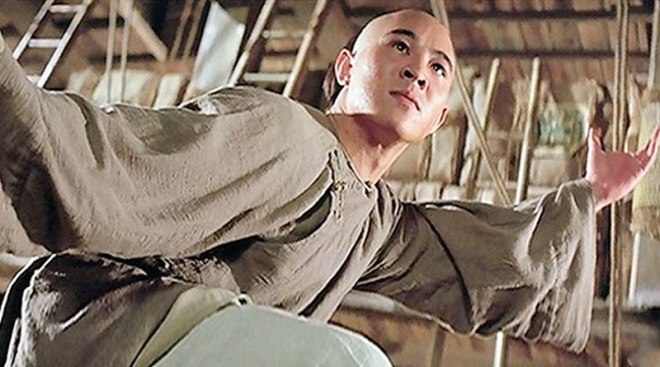
The 1990s era saw a major influx of Wong Fei-Hung movies, with Tsui Hark’s version of the legendary Canton kung fu master being the most popular one of them all. This is especially true with his first two movies, beginning with the 1991 original that Tsui Hark incorporates political allegory and a revisionist take on Jet Li’s eponymous title character, unlike the one seen in the Kwan Tak-Hing era.
It may have been patchy and heavy-handed at times but Once Upon a Time in China <黃飛鴻> remains one of the most entertaining Wong Fei-Hung movies ever made, thanks to Tsui’s engaging direction and of course, Jet Li’s scene-stealing lead performance. The first movie also famously featured one of the best fight scenes ever staged — a climactic moment set in the warehouse, where Wong Fei-Hung and Yen Shi-Kwan’s Iron Robe Yim battling each other on bamboo ladders.
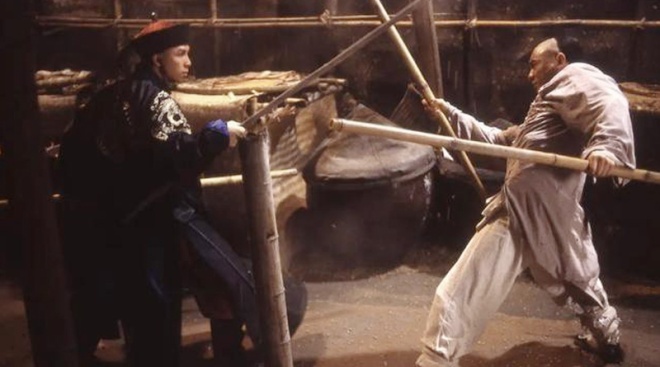
Then, in an immediate follow-up, Tsui Hark manages to improve upon the uneven 1991 original with a briskly paced and above all, cohesive mix of thrilling martial arts, well-timed comedy and intriguing sociopolitical period drama. But those who watched Once Upon a Time in China II <黃飛鴻之二男兒當自強> would probably remember Yuen Woo-Ping’s impressive fight scenes the most, notably the memorable final duel between Wong Fei-Hung and Donnie Yen’s Commander Lan.
17) Summer Snow <女人, 四十> (1995)
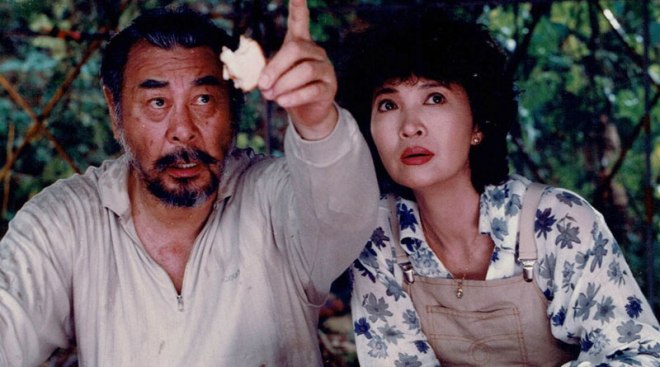
A movie that involves a character suffering from Alzheimer’s disease is no laughing matter. But Ann Hui isn’t interested to turn this into the usual weepy type of disease-of-the-week melodrama. Instead, Summer Snow <女人, 四十> is more of a slice-of-life drama that isn’t afraid to embrace heavy elements of comedy and lighthearted moments. At the hands of a lesser director, this might come across as an insult but Ann Hui manages to find the right balance between humour and drama, thanks to her sure-handed direction.
It also helps that Hui brings out the best in her two veteran principal stars — Josephine Siao and Roy Chiao — both of which deliver the roles of their lifetime — a result that earned them Best Actress and Best Actor respectively at the 15th Hong Kong Film Awards. Chan Man-Keung’s screenplay not only deals with the incurable disease but also the matter-of-fact realities of growing old and the fragility of life. I also love the strong family dynamics between the stubborn and senile widower, Lin Sun (Chiao) and his frustrated but caring daughter-in-law, May Sun (Siao).
In addition to Best Actor and Best Actress, Summer Snow <女人, 四十> also famously dominated the 15th Hong Kong Film Awards with four more wins including Best Film, Best Director, Best Supporting Actor for Law Kar-Ying, who plays May’s supportive husband and Best Screenplay.
18) The Longest Summer <去年煙花特別多> (1998)
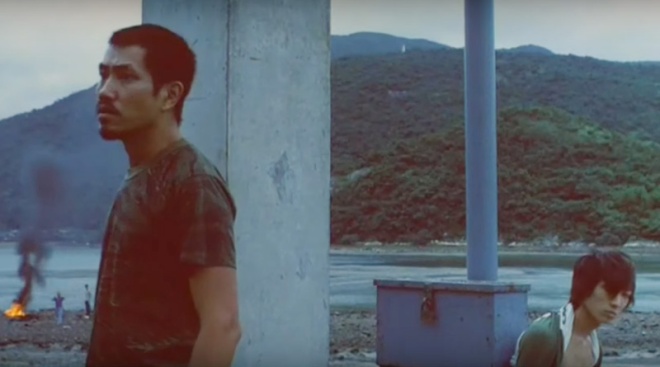
In Fruit Chan’s second movie of his “1997 trilogy”, there’s a brief but thematically evocative dialogue reflecting the changing times in Hong Kong after the handover:
It’s a new world out there.
Seems like Hong Kong became a baby over one night.
You and I, we’re old babies.
No doubt that The Longest Summer <去年煙花特別多> hits close to home, particularly since Fruit Chan filmed part of his movie during the actual Hong Kong handover events. Not only does it add a sense of authenticity but it also made the story of a group of ex-soldiers of the disbanded Hong Kong’s British army (among them including Tony Ho Wah-Chiu’s Ng Ga-Yin) facing disillusionment and uncertainty all the more emotionally involving.
Here, Chan doesn’t shy away from the fact that adapting to change can be such a bitter pill to swallow. The Longest Summer <去年煙花特別多> may carry a depressing tone but Chan still manages to slip in some mean-spirited funny moments, namely a scene where Sam Lee’s Ng Ga-Suen teaches one of the juvenile schoolgirls a lesson by throwing her out of the top window of a moving double-decker bus.
The movie also benefits from an excellent acting ensemble all around, notably then-newcomer Tony Ho Wah-Chiu as a discontented ex-soldier trying to cope and make sense of the situation at the time.
19) The Mission <鎗火 > (1999)
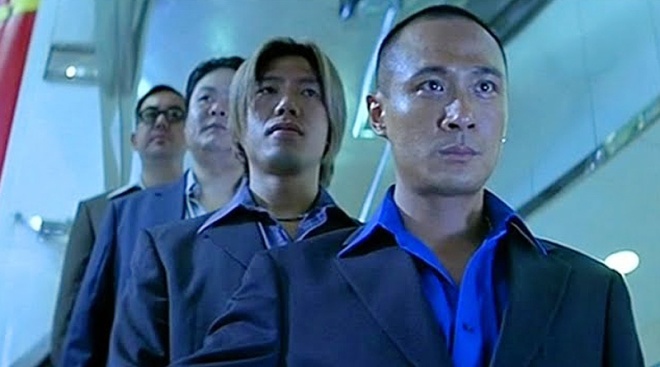
Johnnie To explores the usual themes of triad underworld, loyalty, brotherhood and code of honour in The Mission <鎗火>. But he does so in a unique minimalist style that may alienate most casual viewers looking for the usual stuff. The story itself — credited to Yau Nai-Hoi and the Milkyway Creative Team — is deceptively simple enough: Five different triad members are brought together for one mission and that is to protect Boss Lung (Eddy Ko Hung) from unknown assassins.
Each of these five characters has distinct personalities and the actors who play them are classic Johnnie To archetypes. Among them includes Anthony Wong’s cool-mannered Curtis, a hairstylist who is once a cold-blooded killer and Francis Ng’s short-fused small-time triad boss and not to forget, the obligatory supporting turn from Johnnie To’s regular, Lam Suet as a gun expert who loves munching groundnuts. And you got to hand it to Johnnie To for the way he establishes his characters without relying heavily on dialogue but rather through body language and facial expressions.
Expository scenarios are thrown out of the window in favour of all things bare essentials. Johnnie To also favours moments of deliberate stillness, even during the action scenes such as Akira Kurasawa’s Seven Samurai (1954)-style mall shootout, where the characters are seen standing in strategic positions while firing their guns at the assassins in a sparse manner.
Of course, given this is a Milkyway film, To doesn’t forget to include some quirky moments (the paper football scene in the office comes to mind).
20) Viva Erotica <色情男女> (1996)
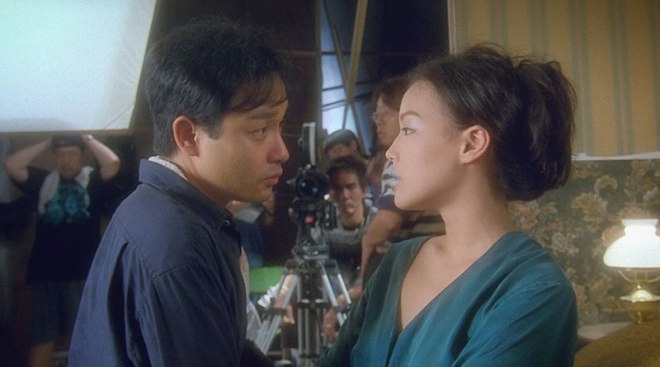
Who could have thought that Derek Yee and (then-newcomer) Lo Chi-Leung collaborated in the adults-only Category III movie? But Viva Erotica <色情男女> is not one of those sleazy and exploitative Hong Kong movies filled with gratuitous sex and nudity. Instead, it’s a sharply-written satirical drama about the Hong Kong film industry and a surprisingly sympathetic viewpoint on the notorious Category III genre and the actors who star in them.
Viva Erotica <色情男女> also benefits from a great ensemble cast, beginning with Leslie Cheung’s lead role as the struggling arthouse film director trying to overcome his ego to make a Category III movie. Law Kar-Ying delivers a hilariously deadpan supporting turn as the pushy film producer. Kudos also go to Shu Qi and Paul Chun’s respective performances as the fussy Category III actress and triad boss. Look out for notable cameo appearances including Lau Ching-Wan playing the director himself, Anthony Wong as Wong Jing as well as Teddy Chen and Yuen Bun.

